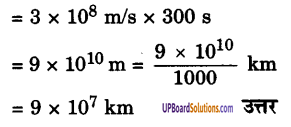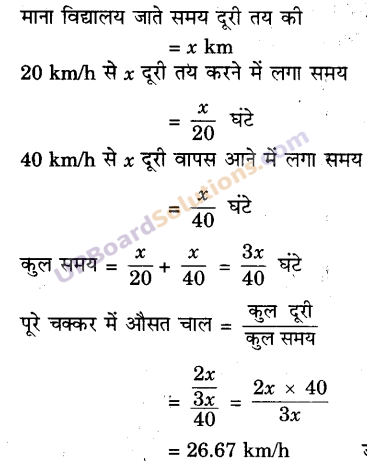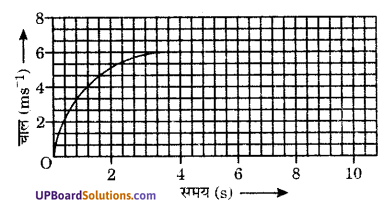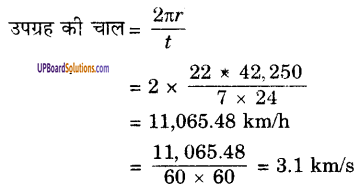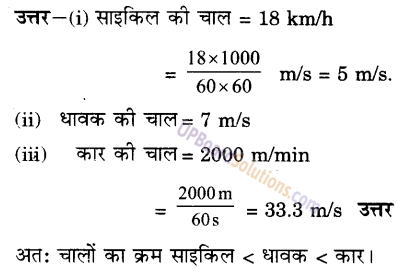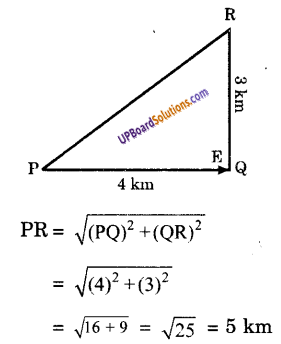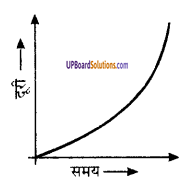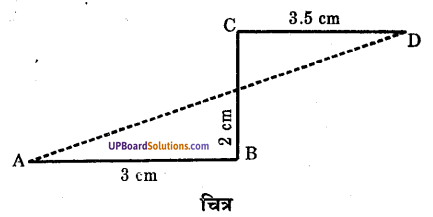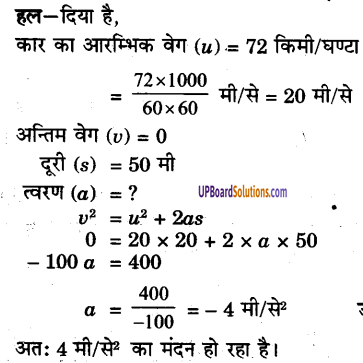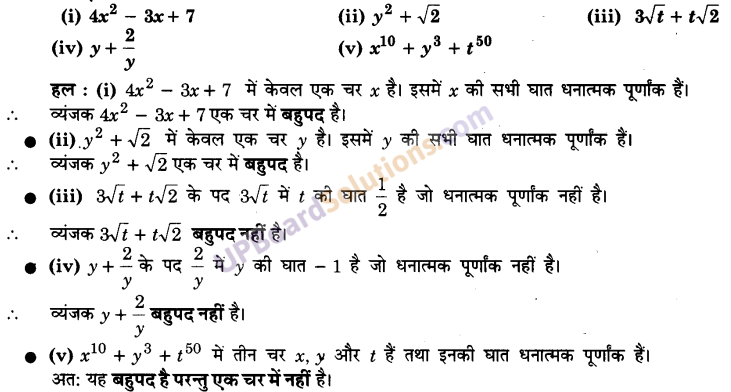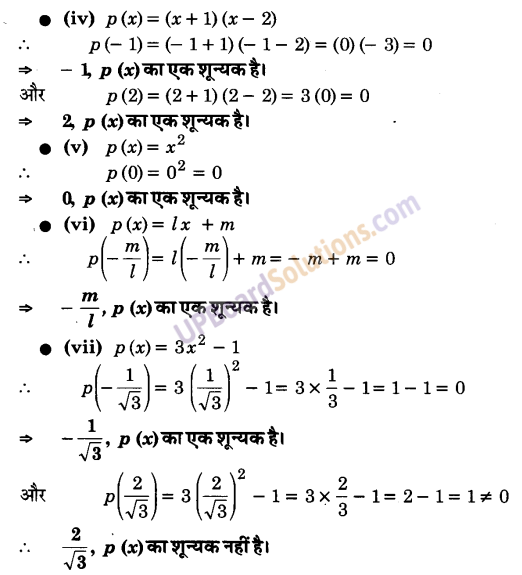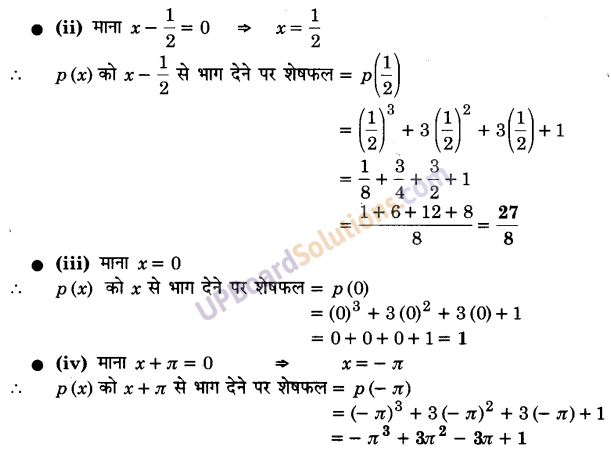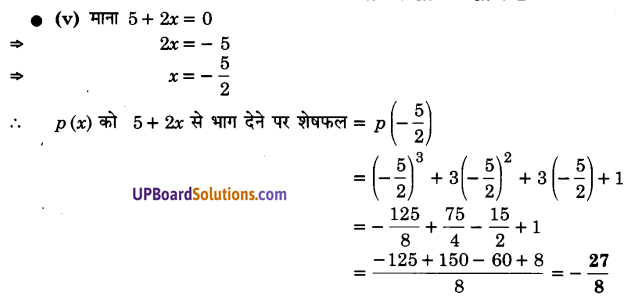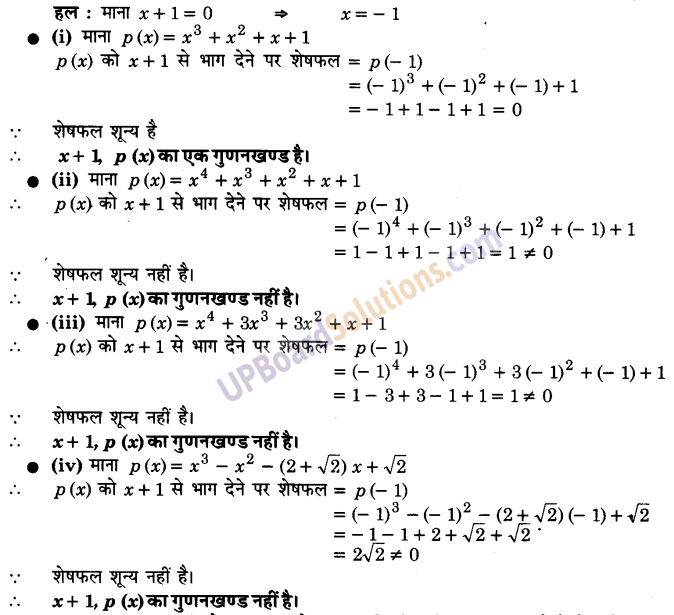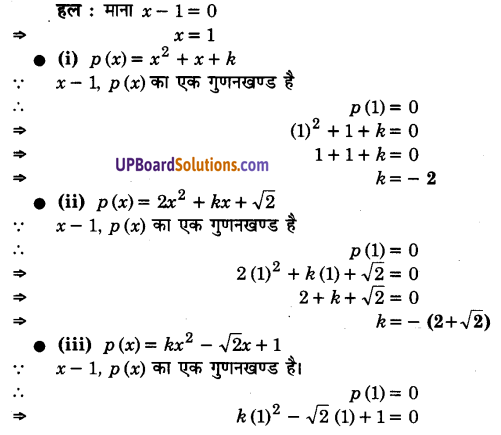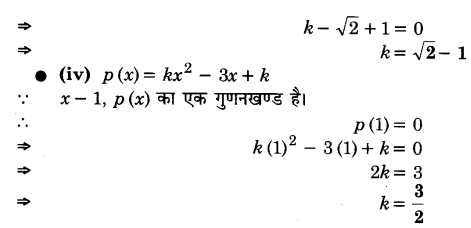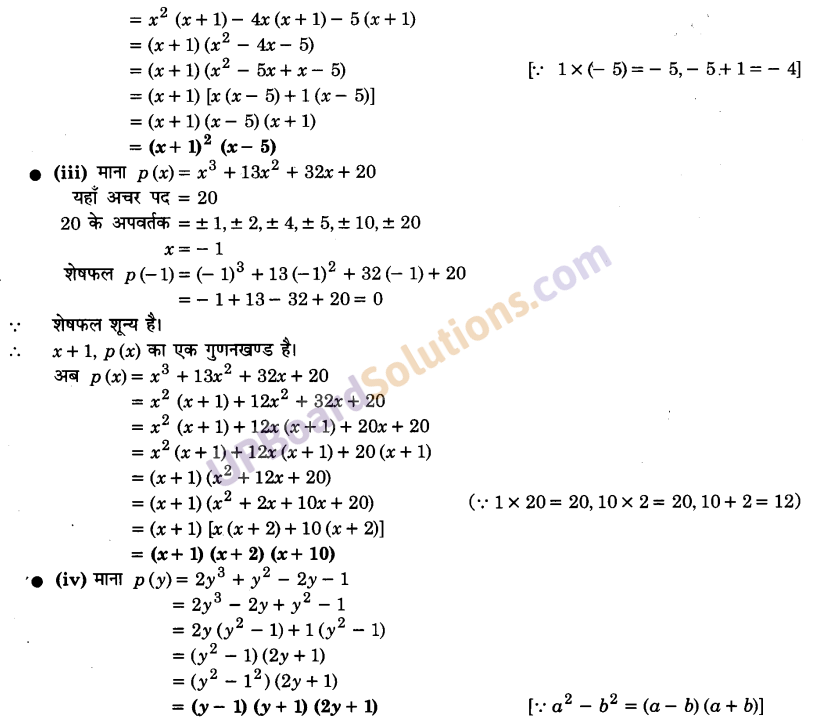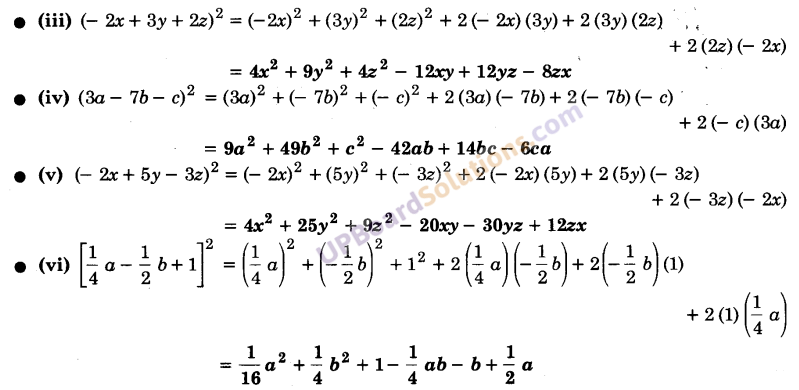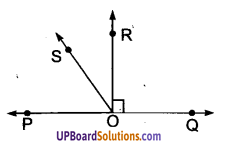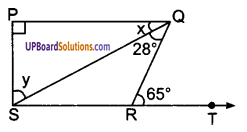UP Board Solutions for Class 9 Social Science Geography Chapter 1 भारत-आकार एवं स्थिति
These Solutions are part of UP Board Solutions for Class 9 Social Science. Here we have given UP Board Solutions for Class 9 Social Science Geography Chapter 1 भारत-आकार एवं स्थिति.
पाठ्य-पुस्तक के प्रश्नोत्तर
प्रश्न 1.
निम्नलिखित चार उत्तरों में से उपयुक्त उत्तर लिखिए-
(i) कर्क रेखा किस राज्य से नहीं गुजरती है?
(क) राजस्थान
(ख) ओडिशा
(ग) छत्तीसगढ़
(घ) त्रिपुरा
![]()
(ii) भारत का सबसे पूर्वी देशांतर कौन-सा है?
(क) 97°25′ पू.
(ख) 77°6′ पू.
(ग) 68°7′ पू.
(घ) 82°32′ पू.
(iii) उत्तराखण्ड, उत्तर प्रदेश, बिहार, पश्चिम बंगाल और सिक्किम की सीमाएँ किस देश को छूती हैं?
(क) चीन
(ख) भूटान
(ग)नेपाल
(घ) म्यांमार
(iv) ग्रीष्मावकाश में आप यदि कावारत्ती जाना चाहते हैं तो किस केंद्रशासित क्षेत्र में जाएँगे?
(क) पुडुचेरी
(ख) लक्षद्वीप
(ग) अंडमान और निकोबार
(घ) दीव और दमन
(v) मेरे मित्र एक ऐसे देश के निवासी हैं जिस देश की सीमा भारत के साथ नहीं लगती है। आप बताइए, वह कौन-सा देश है?
(क) भूटान
(ख) ताजिकिस्तान
(ग) बांग्लादेश
(घ) नेपाल
उत्तर:
(i) (ख) ओडिशा
(ii) (क) 97° 25′ पू०
(iii) (ग) नेपाल
(iv) (ख) लक्षद्वीप
(v) (ख) ताजिकिस्तान।
प्रश्न 2.
निम्न प्रश्नों के उत्तर संक्षेप में दीजिए –
- अरब सागर तथा बंगाल की खाड़ी में स्थित द्वीप समूह के नाम बताइए। दक्षिण में कौन-कौन से द्वीपीय देश हमारे पड़ोसी हैं?
- उन देशों के नाम बताइए जो क्षेत्रफल में भारत से बड़े हैं?
- हमारे उत्तर-पश्चिमी, उत्तरी तथा उत्तर-पूर्वी पड़ोसी देशों के नाम बताइए।
- भारत में किन-किन राज्यों से कर्क रेखा गुजरती है? उनके नाम बताइए।
उत्तर:
- अरब सागर में लक्षद्वीप तथा बंगाल की खाड़ी में अंडमान और निकोबार द्वीप समूह स्थित हैं। भारत के दक्षिण में श्रीलंका तथा मालदीव द्वीपीय देश हमारे पड़ोसी हैं।
- रूस, कनाडा, अमेरिका, चीन, ब्राजील और ऑस्ट्रेलिया क्षेत्रफल में भारत से बड़े देश हैं।
- भारत के उत्तर-पश्चिम में पाकिस्तान व अफगानिस्तान, उत्तर में चीन, नेपाल व भूटान, उत्तर-पूर्व में म्यांमार व बांग्लादेश स्थित हैं।
- कर्क रेखा भारत के गुजरात, मध्य प्रदेश, छत्तीसगढ़, झारखण्ड, पश्चिम बंगाल, त्रिपुरा एवं मिजोरम राज्यों से होकर गुजरती है।
![]()
प्रश्न 3.
सूर्योदय अरुणाचल प्रदेश के पूर्वी भाग में गुजरात के पश्चिमी भाग की अपेक्षा 2 घंटे पहले क्यों होता है, जबकि दोनों राज्यों में घड़ी एक ही समय दर्शाती है? स्पष्ट कीजिए।
उत्तर:
अरुणाचल प्रदेश के पूर्वी भाग में सूर्योदय गुजरात के पश्चिमी भाग की अपेक्षा 2 घण्टे पहले होने के कारण निम्नलिखित हैं-
- सूर्योदय पूर्व में होता है अतः पूर्व में समय पश्चिम की अपेक्षा आगे होता है।
- अरुणाचल प्रदेश के पूर्वी भाग की अंतिम मध्याह्न रेखा 97° 25′ पूर्व है जबकि गुजरात के पश्चिमी भाग की मध्याह्न रेखा 68° 7′ पूर्व है। इन दोनों स्थानों में लगभग 30 मध्याह्न रेखाओं का अंतर है।
- प्रत्येक मध्याह्न रेखा पर सूर्य निकलने के समय में 4 मिनट का अंतर आता है।
- इस प्रकार गुजरात के पश्चिमी भाग में अरुणाचल प्रदेश के पूर्वी भाग की तुलना में समय 2 घण्टे पीछे रहता है।
- भारत की घड़ियाँ 82° 30° पूर्व के मानक समय को मानती हैं और प्रत्येक मध्याह्न रेखा पर घड़ी के अनुसार समय एक जैसा ही रहता है। 82°30′ भारत का मानक याम्योत्तर है। यह रेखा भारत के इलाहाबाद जनपद से होकर गुजरती है।
प्रश्न 4.
हिन्द महासागर में भारत की केन्द्रीय स्थिति से इसे किस प्रकार लाभ प्राप्त हुआ है?
उत्तर:
हिन्द महासागर में भारत की केन्द्रीय स्थिति से इसे निम्नलिखित लाभ प्राप्त हुए हैं-
- भारतीय भूखण्ड पूर्वी एवं पश्चिमी एशिया केन्द्र में स्थित है।
- प्राचीन समय में भारत का समुद्री व्यापार समुद्र मार्ग से होता था। हिन्द महासागर के शीर्ष पर स्थित भारत की केन्द्रीय स्थिति इस कार्य में सहायक रही है।
- भारत के विचार तथा वस्तुओं का आदान-प्रदान अफ्रीका के पूर्वी तटीय देशों, एशिया के पश्चिमी भाग तथा दक्षिणी देशों, पूर्व में चीन, जापान तथा दक्षिणी-पूर्वी देशों के साथ होता रहा है।
- उत्तर में पर्वतों के आर-पार जाने वाले विभिन्न दरों से प्राचीन यात्रियों को आने-जाने का मार्ग मिलता था। उपनिषदों, रामायण, पंचतंत्र की कहानियों, भारतीय अंकों और दशमलव प्रणाली से सम्बन्धित विचार इसी माध्यम से विश्व के अन्य भागों में पहुँचा था। मसाले, मलमल (UPBoardSolutions.com) और व्यापार का अन्य सामान भारत से अन्य देशों में ले जाया जाता था।
- दूसरी ओर यूनानी मूर्तिकला, पश्चिम एशिया से विभिन्न प्रकार के गुंबद एवं मीनार बनाने की भवन निर्माण कला देश के विभिन्न भागों में देखी जा सकती है।
- हिन्द महासागर में स्थित किसी भी अन्य देश का समुद्र तट भारत जितना बड़ा नहीं है और वास्तव में भारत की महत्त्वपूर्ण स्थिति के कारण ही इस महासागर का नामकरण ‘हिन्द महासागर’ भारत के नाम पर किया जाना सही ठहराता है।
मानचित्र कौशल
प्रश्न 1.
दिए गए मानचित्र की सहायता से पहचान कीजिए :
-
- अरब सागर और बंगाल की खाड़ी में स्थित द्वीप समूह
- भारतीय उपमहाद्वीप किन देशों से मिलकर बनता है?
- कर्क रेखा कौन-कौन से राज्यों से गुजरती है?
- भारतीय मुख्य भूभाग का दक्षिणी शीर्ष बिन्दु।
- भारत का सबसे उत्तरी अक्षांश।
- अंशों में भारत का मुख्य भू-भाग का दक्षिणी अक्षांश।
- भारत का सबसे पूर्वी और पश्चिमी देशांतर।
- सबसे लंबी तट रेखा वाला राज्य।
- भारत और श्रीलंका को अलग करने वाली जलसंधि।
- भारत के केंद्रशासित क्षेत्र।
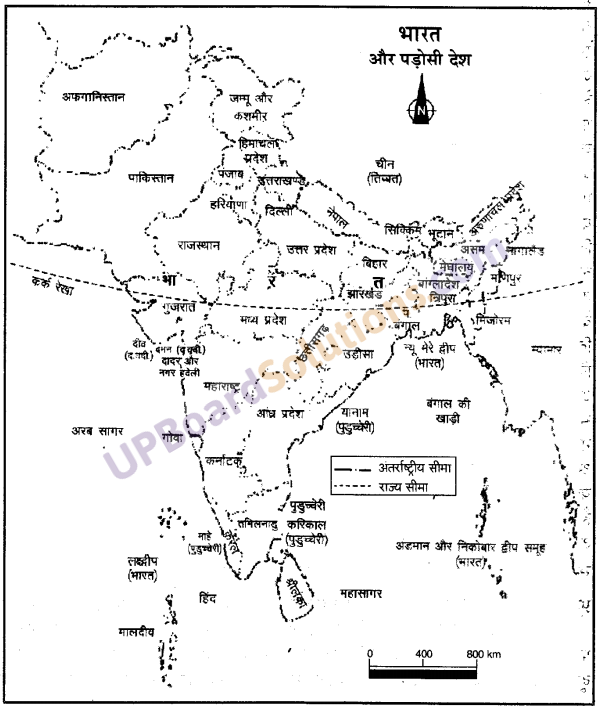
उत्तर:
- लक्षद्वीप तथा अंडमान एवं निकोबार द्वीप समूह।।
- भारत, पाकिस्तान, नेपाल, भूटान, बांग्लादेश, श्रीलंका तथा मालदीव।
- गुजरात, राजस्थान, मध्य प्रदेश, छत्तीसगढ़, झारखण्ड, पश्चिम बंगाल, त्रिपुरा तथा मिजोरम।
- कन्याकुमारी
- 37°6′ उत्तरी
- 8°4′ द.
- 97°25′ पू.,68°7′ पू.
- गुजरात
- पाक जलसंधि
- अंडमान निकोबार द्वीप समूह, लक्षद्वीप समूह, चंडीगढ़, दादर व नगर हवेली, दमन व दीव, दिल्ली और पुडुचेरी।
परियोजना कार्य
![]()
प्रश्न 1.
- अपने राज्य का विस्तार अक्षांश और देशांतर में ज्ञात कीजिए।
- रेशम मार्ग’ के बारे में सूचना एकत्र कीजिए। यह भी ज्ञात कीजिए कि किन नई विकास योजनाओं द्वारा उच्च पर्वतीय क्षेत्रों में आवागमन के मार्ग विकसित किए गए हैं?
उत्तर:
- इस प्रश्न का समाधान विद्यार्थी अध्यापक की (UPBoardSolutions.com) सहायता से करें।
- रेशम मार्ग-रेशम मार्ग’ चीन एवं भूमध्य सागर के बीच अंतर्राष्ट्रीय व्यापार का एक महत्त्वपूर्ण मार्ग है। क्योंकि इस मार्ग से होने वाले व्यापार में रेशम का एक बड़ा हिस्सा होता था, अतः 1877 ई0 में फड़नेन्ड वॉन रिक्टॉफेन नामक एक प्रसिद्ध जर्मन भूगोलवेत्ता ने इसका नाम ‘रेशम मार्ग’ रख दिया। पारंपरिक रेशम मार्ग पूर्व एवं पश्चिम के बीच संबंध के कारण विकसित हुआ जिसने सांस्कृतिक विरासत के आदान-प्रदान को बढ़ावा दिया। हाल के वर्षों में रेशम मार्ग एक बार पुनः समुद्री मार्ग एवं थल मार्ग दोनों से प्रयोग किया जा रहा है।
नई विकास योजनाओं द्वारा आवागमन के साधनों का विकास0 सुरंगें बनाकर रेलवे लाइनें बिछाई गई हैं-
-
- रोपवे (Ropeway) बनाए गए हैं।
- केबिल पुलों का निर्माण किया गया है।
- संचार संसाधनों का विकास किया गया है।
- प्रधानमंत्री ग्रामीण सड़क योजना के अंतर्गत हर गाँव को मुख्य कस्बे या जिला मुख्यालय से जोड़ा जा रहा है।
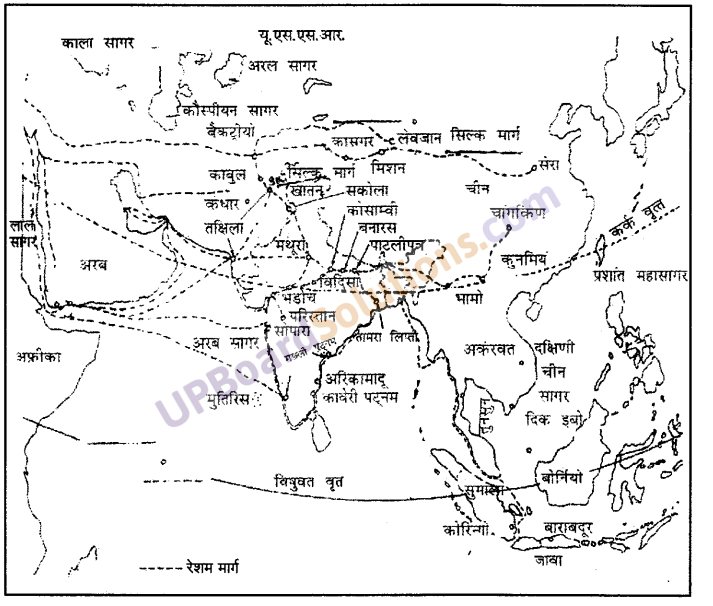
अन्य महत्त्वपूर्ण प्रश्नोत्तर
अतिलघु उत्तरीय प्रश्न
प्रश्न 1.
सन् 2014 में आंध्र प्रदेश के पुनर्गठन से उत्पन्न दो राज्यों को लिखिए।
उत्तर:
आंध्र प्रदेश को विभाजित करके तेलंगाना और आंध्र प्रदेश दो राज्य अस्तित्व में आए। तेलंगाना की राजधानी हैदराबाद है जबकि आंध्र प्रदेश की राजधानी अमरावती में निर्माणाधीन है।
प्रश्न 2.
उत्तर प्रदेश, मध्य प्रदेश और बिहार की राजधानियों के नाम बताइए।
उत्तर:
उत्तर प्रदेश की राजधानी लखनऊ, मध्य प्रदेश की भोपाल और बिहार की पटना है।
प्रश्न 3.
बांग्लादेश की सीमा को स्पर्श करने वाले चार भारतीय राज्यों के नाम लिखिए।
उत्तर:
- पश्चिम बंगाल,
- असोम,
- मेघालय,
- मिजोरम।
![]()
प्रश्न 4.
अरब सागर को स्पर्श करने वाले चार भारतीय राज्यों के नाम बताइए।
उत्तर:
- केरल,
- कर्नाटक,
- महाराष्ट्र,
- गुजरात।
प्रश्न 5.
भारत का मानक समय ग्रीनविच के समय से कितना आगे है?
उत्तर:
भारत का मानक समय ग्रीनविच के समय से साढ़े पाँच घण्टे आगे है।
प्रश्न 6.
मालदीव कहाँ स्थित है?
उत्तर:
मालदीव देश लक्षद्वीप के दक्षिण में स्थित है।
प्रश्न 7.
क्षेत्रफल की दृष्टि से भारत का विश्व में कौन-सा स्थान है?
उत्तर:
क्षेत्रफल की दृष्टि से भारत का विश्व में सातवाँ स्थान है।
प्रश्न 8.
भारत की स्थलीय सीमा की लंबाई बताइए।
उत्तर:
भारत की स्थलीय सीमा की लंबाई लगभग 15,200 किमी है।
प्रश्न 9.
भारत के पूर्वी तट पर स्थित चार राज्यों के नाम बताइए।
उत्तर:
तमिलनाडु, आंध्र प्रदेश, ओडिशा तथा पश्चिम बंगाल भारत के पूर्वी तट पर स्थित चार राज्य हैं।
प्रश्न 10.
क्षेत्रफल की दृष्टि से भारत के सबसे बड़े और सबसे छोटे राज्यों के नाम बताइए।
उत्तर:
क्षेत्रफल की दृष्टि से राजस्थान सबसे बड़ा और गोवा सबसे छोटा राज्य है।
प्रश्न 11.
देश में राज्यों और केन्द्रशासित प्रदेशों की संख्या कितनी है?
उत्तर:
आज देश में राज्यों की कुल संख्या 29 और संघशासित प्रदेशों की संख्या 7 है।
प्रश्न 12.
उत्तर में भारत की सीमा किन राज्यों को स्पर्श करती है?
उत्तर:
उत्तर में भारत की सीमा चीन, नेपाल व भूटान देशों को स्पर्श करती है।
![]()
प्रश्न 13.
भारत की प्रामाणिक समय रेखा कौन-सी है और यह कहाँ से गुजरती है?
उत्तर:
भारत की प्रामाणिक समय रेखा 82° 30′ पूर्व देशांतर पर स्थित है और यह इलाहाबाद के पास मिर्जापुर से होकर गुजरती है।
प्रश्न 14.
भारत के दो पड़ोसी द्वीपीय राज्य कौन-से हैं?
उत्तर:
भारत के दो पड़ोसी द्वीपीय राज्य श्रीलंका और मालदीव हैं।
प्रश्न 15.
भारत के तीनों ओर स्थित सागरों के नाम बताइए।
उत्तर:
भारत के पूर्व में बंगाल की खाड़ी, पश्चिम में अरब सागर तथा दक्षिण में हिन्द महासागर स्थित है।
प्रश्न 16.
कौन से राज्य अंतर्राष्ट्रीय सीमा तथा समुद्र तट को स्पर्श नहीं करते हैं?
उत्तर:
हरियाणा, मध्य प्रदेश, छत्तीसगढ़, झारखण्ड राज्य की सीमा न ही अंतर्राष्ट्रीय सीमा और न ही समुद्र तट से मिलती है।
प्रश्न 17.
कन्याकुमारी और कश्मीर में दिन-रात की अवधि में अंतर क्यों है?
उत्तर:
कन्याकुमारी विषुवत् रेखा के समीप है और विषुवत् रेखा पर दिन-रात बराबर होते हैं। जबकि कश्मीर 35° उत्तरी अक्षांश पर स्थित है इसलिए कश्मीर में ग्रीष्म और शीत ऋतु में दिन-रात बराबर नहीं होते। ग्रीष्म ऋतु में दिन बड़ा होता है और शीत ऋतु में रात बड़ी होती है।
प्रश्न 18.
1947 से पूर्व भारत में किस तरह के दो प्रकार के राज्य थे?
उत्तर:
1947 से पूर्व भारत में दो प्रकार के राज्य थे, प्रांत और रियासत। वायसराय द्वारा नियुक्त अंग्रेज अधिकारी प्रांतों १५ शासन करते थे और रियासतों का शासन स्थानीय शासकों द्वारा पैतृकता के आधार पर अंग्रेजी शासकों की प्रभुसता मानकर स्वायत्तता से किया जाता था।
![]()
प्रश्न 19.
उपमहाद्वीप किसे कहते हैं? कौन से देश मिलकर भारतीय उपमहाद्वीप बनाते हैं।
उत्तर:
उपमहाद्वीप एक विशाल भौगोलिक इकाई है जो शेष महाद्वीप से अलग दिखाई देती है। भारतीय उपमहाद्वीप ?
पाकिस्तान, भारत, नेपाल, भूटान, बांग्लादेश सम्मिलित हैं।
प्रश्न 20.
कर्क रेखा से क्या तात्पर्य है?
उत्तर:
23°30′ उत्तर अक्षांश से गुजरने वाली रेखा है जो पूरे देश को लगभग दो बराबर भागों में बाँटती है जिसे कर्क रेखा कहा जाता है।
लघु उत्तरीय प्रश्न
प्रश्न 1.
भारत की भौगोलिक स्थिति और विस्तार को स्पष्ट कीजिए।
उत्तर:
क्षेत्रफल की दृष्टि से भारत का विश्व में सातवाँ स्थान है। भारत का क्षेत्रफल 32.8 लाख वर्ग किमी है। यह विश्व के कुल भू-भाग का 2.4 प्रतिशत है। भारत की मुख्य भूमि 8°4′ उत्तर से 37°6′ उत्तरी अक्षांशों के बीच फैली हुई है। भारत का देशान्तरीय विस्तार 68°7′ पू. से 97°25° पूर्वी देशान्तरों के बीच है। कर्क वृत्त (23° 30′ उ.) भारत को लगभग दो समान भागों में बांटता है। भारत हिन्द महासागर के शीर्ष पर (UPBoardSolutions.com) अपनी केन्द्रीय स्थिति के कारण सभी अंतर्राष्ट्रीय व्यापार मार्गों का संगम है। परिणामस्वरूप विश्व के लगभग सभी देशों के साथ इसके व्यापारिक सम्बन्ध हैं।
प्रश्न 2.
82°30′ को भारत का मानक अक्षांश क्यों चुना गया?
उत्तर:
82°30′ को भारत का मानक अक्षांश चुना गया है क्योंकि यह उन अक्षांश एवं देशांतर रेखाओं के मध्य में स्थित है जिनमें हमारा देश स्थित है। यह इलाहाबाद से गुजरती है। भारतीय मानक समय (IST) की गणना 82.5° पू. अक्षांश से की जाती है जो कि उत्तर प्रदेश में इलाहाबाद के पास स्थित मिर्जापुर कस्बे के एकदम पूर्व से गुजरती है। समय के अंतर के कारण किसी प्रकार के भ्रम से बचने और पूरे देश के लिए एक मानक समय निर्धारित करने के लिए 82°30° पू. अक्षांश से गुजरने वाली रेखा को चुना गया है। यही कारण है कि पूरे देश में घड़ियाँ एक ही समय दर्शाती हैं।
प्रश्न 3.
भारत दक्षिण एशिया में महत्त्वपूर्ण सामरिक स्थिति में है। स्पष्ट कीजिए।
उत्तर:
भारतीय भू-भाग पूर्व एवं पश्चिम एशिया के मध्य में स्थित है। भारत, एशिया महाद्वीप के दक्षिण में विस्तृत हैं।
भारत पश्चिम स्थित यूरोप के देशों को पूर्व में स्थित एशियाई देशों को जोड़ने वाले हिन्द महासागर पार के समुद्री मार्ग की सामरिक केन्द्रीय स्थिति में है। भारतीय भूखंड पूर्व एवं पश्चिम एशिया के मध्य में स्थित है। भारत का जो भाग एशिया महाद्वीप से जुड़ा हुआ है (भू-मार्ग एवं दरों के रास्ते से) (UPBoardSolutions.com) वह भारत को इसके उत्तर, पश्चिम एवं पूर्व में स्थित विभिन्न देशों से जोड़ता है। दक्षिण प्रायद्वीप हिन्द महासागर में दूर तक चला गया है जिससे भारत को पश्चिमी तट से पश्चिम एशियाई, अफ्रीका और यूरोप तथा दक्षिणपूर्वी एवं पूर्वी तट से पूर्व एशिया के देशों के साथ नजदीकी संबंध बनाने में मदद मिलती है।
प्रश्न 4.
भारत को उपमहाद्वीप का दर्जा क्यों दिया जाता है? भारतीय उपमहाद्वीप किन देशों से मिलकर बना है?
उत्तर:
भारत एशिया महाद्वीप के दक्षिण में स्थित है। एशिया का भाग होते हुए भी यह एक विशिष्ट भौगोलिक इकाई है। हिमालय पर्वत इसे शेष एशिया से पृथक् करता है। भारत की इसी विशेषता के कारण भारत को उपमहाद्वीप का दर्जा दिया जाता है। भारतीय उपमहाद्वीप में भारत के अतिरिक्त पाकिस्तान, नेपाल, भूटान, बांग्लादेश, श्रीलंका, मालदीव आदि देश शामिल हैं।
प्रश्न 5.
कर्क वृत्त भारत को दो समान भागों में विभक्त करता है। इन दोनों भागों का संक्षिप्त विवेचन कीजिए।
उत्तर:
भारत का उत्तरी भाग-भारत का कर्क वृत्त के उत्तर में फैला हुआ विशाल भू-भाग है। यह पूर्व से पश्चिम की ओर विस्तृत है। इसमें ऊँचे पर्वत तथा विशाल मैदान स्थित हैं।
भारत का दक्षिणी भाग – भारत का कर्क वृत्त के दक्षिण में फैला हुआ भाग त्रिभुजाकार है। इस त्रिभुज का आधार उत्तर की ओर है। दक्षिण की ओर जाते हुए यह भाग संकीर्ण होता जाता है। इस भाम में मुख्य रूप से प्रायद्वीपीय पठार एवं पश्चिमी तटीय मैदान सम्मिलित हैं।
प्रश्न 6.
विश्व क्षेत्रफल की दृष्टि से भारत की स्थिति स्पष्ट कीजिए।
उत्तर:
भारत संसार का सातवाँ बड़ा देश है। इससे बड़े 6 देश हैं-रूस, कनाडा, संयुक्त राज्य अमेरिका, चीन, ब्राजील तथा आस्ट्रेलिया।
- यह तीन गोलार्थों में स्थित है-उत्तरी गोलार्द्ध, पूर्वी गोलार्द्ध तथा स्थलीय गोलार्द्ध।
- इसका पूर्व-पश्चिम विस्तार 2,933 किमी तथा उत्तर दक्षिण विस्तार 3,214 किमी है।
- इसका कुल क्षेत्रफल विश्व के क्षेत्रफल का 2.4% है।
- पूर्वी सीमा पर बंगाल की खाड़ी, पश्चिमी सीमा पर अरब सागर तथा दक्षिणी सीमा पर हिंद महासागर इसकी प्राकृतिक सीमा निर्धारित करते हैं।
- पश्चिम में पाकिस्तान, उत्तर-पश्चिम में अफगानिस्तान, उत्तर तथा उत्तर-पूर्व में चीन, उत्तर में नेपाल, पूर्व में म्यांमार तथा बांग्लादेश भारत की स्थल सीमा निर्धारित करते हैं।
![]()
प्रश्न 7.
भारत में स्थानीय समय में अंतर की समस्या का समाधान किस प्रकार निकाला गया है?
उत्तर:
भारत के पूर्वी एवं पश्चिमी भागों के स्थानीय समय में अंतर के कारण उत्पन्न समस्याओं के निराकरण के लिए एक मानक समय निर्धारित किया गया। मानक समय का निर्धारण प्रधान मध्याह्न रेखा के समय के आधार पर किया जाता है। संसार को 15° देशांतर के अंतर पर 24 समय क्षेत्रों में बाँटा गया है। इनमें से प्रत्येक समय क्षेत्र की मानक मध्याह्न रेखा, ऐसी चुनी । जाती है, जो 74° से विभाजित हो।। एक समय क्षेत्र में अधिकतम आधे घंटे का अंतर हो, इसलिए 7%° से ‘विभाजित देशांतर को संबंधित क्षेत्र न्यू मूर द्वीप (UPBoardSolutions.com) की मानक रेखा माना जाता है।
चित् झील की मानक मध्याह्न रेखा 824° पूर्वी देशांतर है।
बंगाल की खाड़ी विस्तार अधिक होने से हमारे दैनिक ‘क्रिया-कलापों का प्रारंभ और समापन अलग-अलग स्थानों पर अलग-अलग
-
- कच्छ की खाड़ी समय पर होता है। लेकिन देश में
- खंभात की खाड़ी
- मन्नार की खाड़ी मानक मध्याह्न रेखा के समय के
- पाक जलसंधि आधार पर ही घड़ियाँ चलती हैं। ‘यही समय सब जगह एक जैसा होता है। स्थान-स्थान का स्थानीय समय अलग होता है मगर मानक समय सब स्थानों पर समान होता है।

प्रश्न 8.
भारत के सबसे पूर्वी एवं पश्चिमी भू-भाग में सूर्योदय के समय में अंतर का क्या कारण है?
उत्तर:
भारत के सबसे पूर्वी क्षैतिज पर पश्चिमी सिरे की क्षैतिज से 2 घंटे पहले सूर्य उदय होता है। अर्थात् अरुणाचल प्रदेश का वासी जब अपनी प्रातः की दिनचर्या प्रारंभ करता है, उस समय गुजरात प्रदेश का वासी आराम से सोया होता है। दूसरी ओर सायं के समय अरुणाचल प्रदेश का वासी दैनिक कार्य को समाप्त कर विश्राम करने की स्थिति में होता है, उस समय गुजरात का वासी अपने दैनिक कार्य को समाप्त करने (UPBoardSolutions.com) में जुटा होता है। भारत का देशांतरीय विस्तार 30° है। दो देशांतरों के बीच सूर्य उदय होने में 4 मिनट का अंतर आता है। पूर्वी और पश्चिमी सीमांतों पर 30 x 4 = 120 मिनट अर्थात् 2 घंटे का अंतर हो जाता है।
प्रश्न 9.
कन्याकुमारी में दिन और रात की अवधि में कम अंतर पाया जाता है जबकि कश्मीर में यह अंतर अधिक है। ऐसा क्यों?
उत्तर:
विषुवत् वृत्त पर स्थित स्थानों को छोड़ सभी स्थानों पर दिन और रात असमान होते हैं। विषुव वृत्त से ध्रुवों की ओर जाने पर दिन-रात की अवधि में अंतर बढ़ता जाता है। यहाँ तक कि ध्रुवों पर छः महीने की रात और छः महीने का दिन होता है।
भारत का अक्षांशीय विस्तार 6°48′ उत्तर से लेकर 37°6′ तक है। कन्याकुमारी भारत की मुख्य भूमि का दक्षिणतम सिरा है, जो विषुवत् वृत्त के निकट है। अतः कन्याकुमारी में यह अंतर केवल 45 मिनट का हो जाता है।
कश्मीर के उत्तरतम भागों में यह अंतर बढ़कर 5 घंटे का हो जाता है।
दीर्घ उत्तरीय प्रश्न
प्रश्न 1.
भारत के राज्यों एवं केन्द्रशासित प्रदेशों का विवरण प्रस्तुत कीजिए।
उत्तर:
वर्तमान में भारत में 29 राज्य और 7 संघशासित क्षेत्र हैं, जिनका विवरण इस प्रकार है|
राज्य–
- जम्मू और कशमीर ,
- पंजाब,
- हरियाणा,
- हिमाचल प्रदेश,
- उत्तर प्रदेश,
- बिहार,
- पश्चिम बंगाल,
- सिक्किम,
- असोम,
- नगालैण्ड,
- अरुणाचल
- मणिपुर,
- तांग्लादेश मणिपुर मिजोरम,
- मेघालय,
- त्रिपुरा,
- ओडिशा,
- मध्य प्रदेश,
- राजस्थान,
- गुजरात,
- महाराष्ट्र,
- गोवा,
- आंध्र प्रदेश,
- कर्नाटक,
- केरल,
- तमिलनाडु,
- छत्तीसगढ़,
- उत्तराखण्ड,
- झारखण्ड,
- तेलंगाना।

केन्द्रशासित क्षेत्र
- अण्डमान निकोबार द्वीप समूह,
- चंडीगढ़,
- दादर व नगर हवेली,
- दिल्ली,
- दमन व दीव,
- लक्षद्वीप,
- पुडुचेरी।
उल्लेखनीय है कि दमन व दीव दो अलग-अलग स्थानों पर स्थित हैं जबकि करैकल, यमन व माहे, ये तीन स्थान केन्द्र शासित क्षेत्र पुडुचेरी के अंतर्गत आते हैं।
![]()
प्रश्न 2.
भारत की स्थिति और विस्तार का वर्णन कीजिए।
उत्तर:
उत्तरी गोलार्द्ध में स्थित भारत विश्व का सातवाँ बड़ा देश है। इसका भौगोलिक विस्तार 8°4′ उत्तर से 37° 6′ उत्तरी अक्षांश तक तथा 68° 7′ पूर्व से 97° 25′ पूर्व देशान्तर तक फैला है। 23° 30′ उत्तर अक्षांश रेखा जिसे कर्क रेखा भी कहते हैं, भारत को दो लगभग समान भागों में बांटती है। भारत के मुख्य भू-भाग के दक्षिण-पूर्व में अंडमान और निकोबार द्वीप समूह बंगाल की खाड़ी में तथा लक्षद्वीप समूह अरब (UPBoardSolutions.com) सागर में क्रमशः स्थित हैं। गुजरात, राजस्थान, मध्य प्रदेश, छत्तीसगढ़, झारखण्ड, पश्चिम बंगाल, त्रिपुरा और मिजोरम ऐसे राज्य हैं जिनमें से कर्क रेखा गुजरती है।
भारत के भूभाग का कुल क्षेत्रफल लगभग 32.8 लाख वर्ग किलोमीटर है। भारत का क्षेत्रफल विश्व के कुल भौगोलिक क्षेत्रफल का 2.4 प्रतिशत है। यह विश्व का सातवाँ सबसे बड़ा देश है। भारत की थल सीमा रेखा लगभग 15,200 किमी और समुद्री तट रेखा अंडमान और निकोबार द्वीप समूह और लक्षद्वीप समूह को मिलाकर 7,516 किमी है। भारत उत्तर-पश्चिम, उत्तर एवं उत्तर-पूर्वी सीमा पर नवीनतम वलित पर्वतों से घिरा हुआ है। यह दक्षिण में 22° उत्तर अक्षांश से हिन्द महासागर की ओर संकरा होता चला गया है जहाँ इसे दो सागरों पश्चिम में अरब सागर तथा पूर्व में बंगाल की खाड़ी में विभाजित कर देता है।
Hope given UP Board Solutions for Class 9 Social Science Geography Chapter 1 are helpful to complete your homework.
If you have any doubts, please comment below. UP Board Solutions try to provide online tutoring for you.


